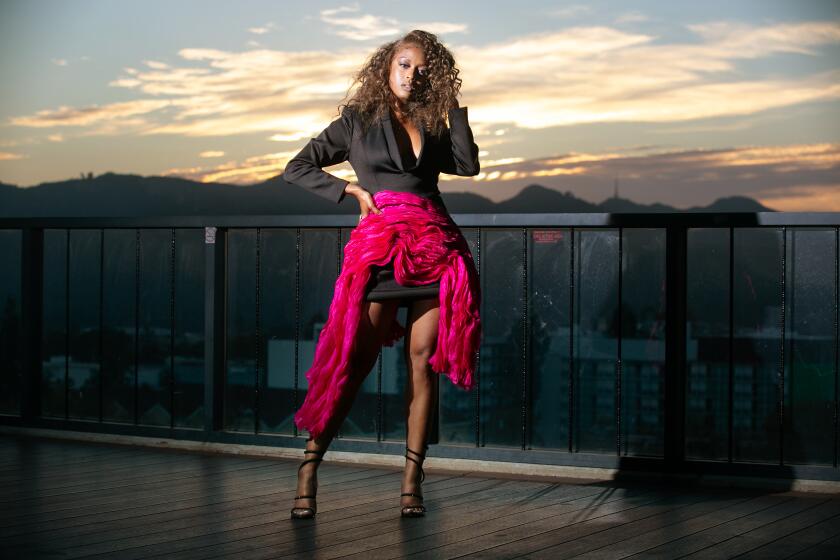‘Badass women’ reshaped the culture. Now, it’s time to move on
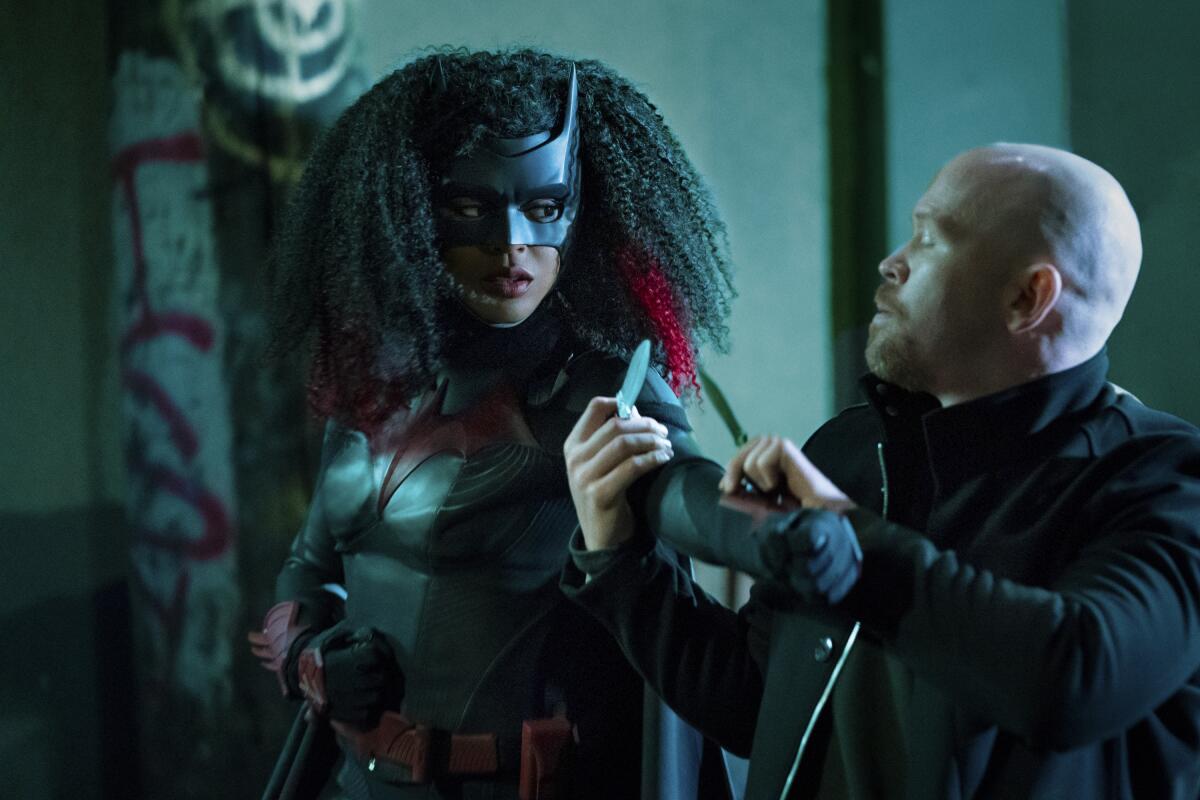
- Share via
Once “Batwoman” showrunner Caroline Dries knew that the best way for the series to move forward following the departure of its original lead actor was to introduce a brand-new character to carry the mantle, her world opened up creatively.
The CW superhero show, which premiered in 2019, initially followed Kate Kane (Ruby Rose), who, like her comic book counterpart, is Bruce Wayne’s cousin and becomes Gotham City’s newest masked vigilante, Batwoman, during Batman’s absence. In “Batwoman’s” second season, Ryan Wilder (Javicia Leslie) — an original character created for the TV series — picks up the storied cape and cowl after Kate disappears.
“I love Kate Kane, it’s why I did the show,” said Dries. “But I inherited a character with a set of characteristics and personality traits and a backstory and interpersonal issues. And now all of a sudden, I’m allowed to do literally whatever I want.”
On suiting up to replace Ruby Rose in the iconic role, Leslie says she “felt an immense amount of responsibility to save the world. Me, Javicia.”
What Dries wanted was to explore a different kind of hero than Kate, who was often seen as a “female Bruce Wayne.” Rather than a billionaire with privilege and access, Ryan is introduced as an unemployed parolee who lives in her van and served time for a crime she didn’t commit.
“Batwoman’s” third season, slated to premiere in October, will see Ryan continue to spread her wings — this time, without the looming specter of her predecessor, since the second season culminated with the official passing of the Bat-torch. More broadly, the show continues a legacy of onscreen heroines, often described by the shorthand “badass women,” who have been captivating audiences for years in shows such as “Xena: Warrior Princess,” “Buffy the Vampire Slayer” and the reimagined “Battlestar Galactica.”
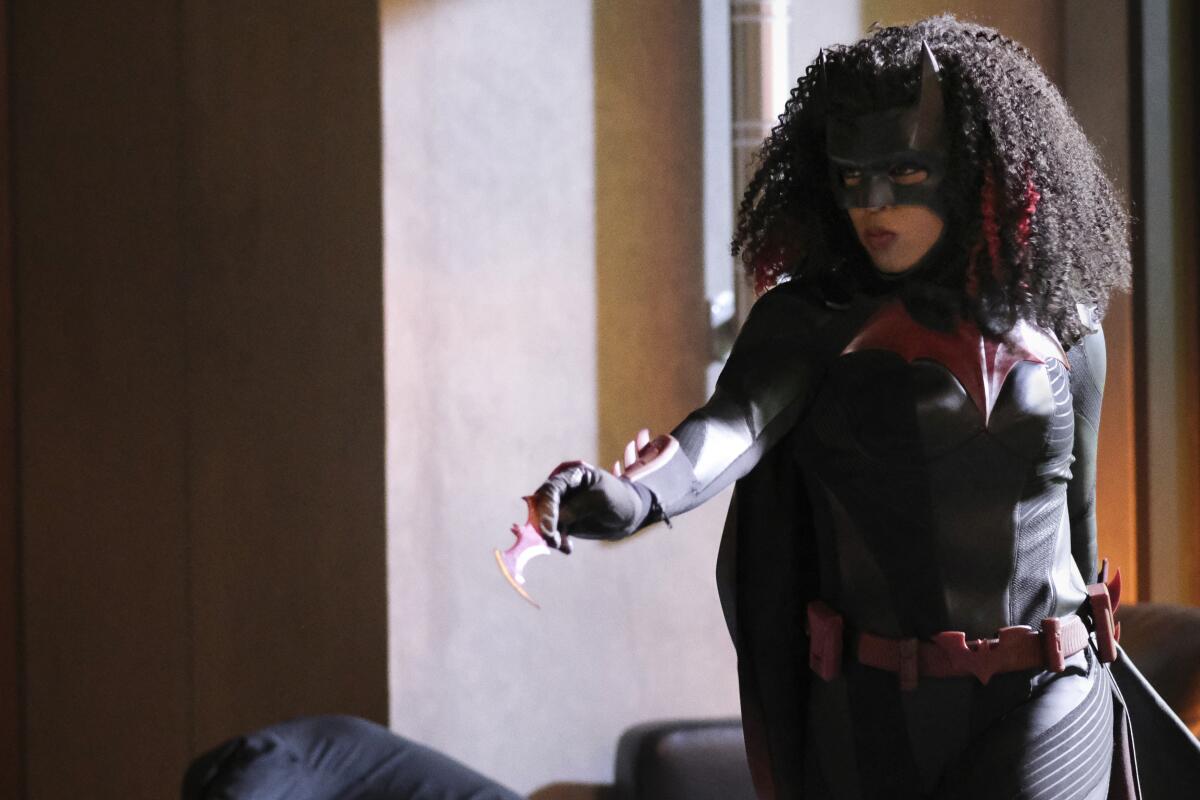
These women we can’t help but root for include vigilante crime fighters protecting the vulnerable; magical warriors waging battle against those who terrorize the masses; highly trained assassins seeking revenge or to atone for their past; and social outcasts with mysterious powers trying to change the world.
But Ryan and her “Batwoman” journey are indicative of how genre films and TV shows are pushing the boundaries of the “badass women” trope. In the past, these characters — tough, formidable, conventionally attractive — felt empowering compared with the more helpless side roles women were frequently relegated to. And while Hollywood has produced a handful of notable standouts, including Sarah Connor (“Terminator”) and Ellen Ripley (“Alien”), their copycats have just as often exposed the trope’s limitations, failing to capture the multidimensionality that made Connor and Ripley “badass.”
“Ryan’s journey [in Season 2 was about] tapping into the awesome, amazing, powerful woman that society has told her she’s not,” said Dries. It “has judged her so much that it’s preventing her from seeing that. She has to go through this superhero’s journey — to literally put on a suit, be a hero and be physically powerful — to come to realize, ‘That was inside of me all along. I don’t really need a suit.’”
Ryan isn’t just a collection of traits; she’s human, and it’s because of the nuances that make her who she is that “Batwoman” has been able to tackle storylines dealing with systemic racism and police violence in a way that a show centered on Kate Kane might not have been able to.
“Genre entertainment has an opportunity to talk about stuff that’s going on in a way that’s sort of once removed,” said “Motherland: Fort Salem” creator Eliot Laurence. “So it doesn’t feel necessarily like a lesson or ‘a very special episode,’ but you can talk about [what’s happening in] the world.”
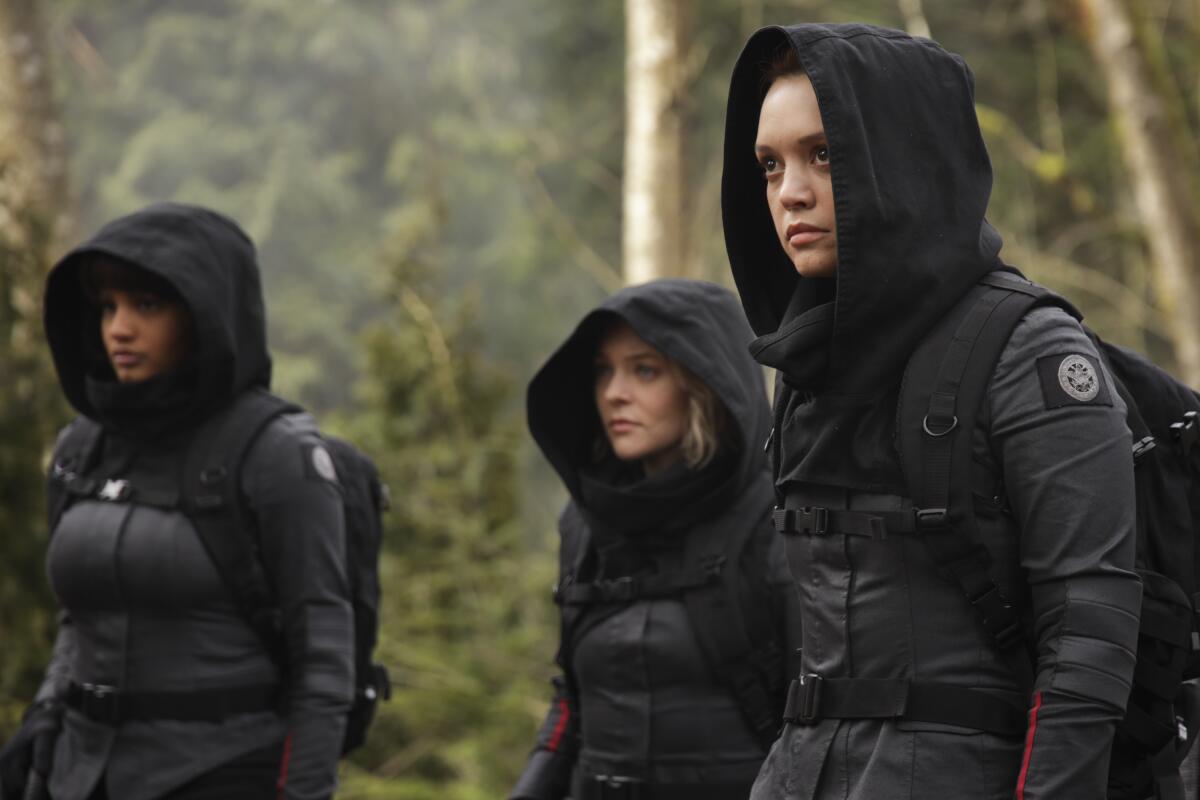
The Freeform series, which concludes its second season on Tuesday, is set in an alternate U.S. where witches have been conscripted into the army for hundreds of years. It’s a show that “explore[s] duty and honor and ethics and sacrifice from a young female perspective.”
“It’s not a world where the matriarchy has won — yet,” said Laurence. “It’s definitely where I’m going in the series. [But] right now, it’s just the pocket world of the military that kind of puts female power in such a primary place.”
These witches are trained soldiers who are sent to the front lines while navigating family, friendships and romance as well as questions of authority, U.S. history and the power of institutions.
Mainstream fantasy TV often depicts white characters in white worlds. “His Dark Materials” and “Bridgerton” are among the shows trying to change that.
“Motherland’s” second season has shown that despite a long-standing agreement that has kept witches from being officially persecuted in the U.S., there are still people wary of them. The series has explored how even in a world where witches are recognized as a potent force and integrated into an organization like the military, misunderstanding and fear can foment hate and violence.
Beyond its real-world relevance, though, the thrill of “Motherland” is in seeing so many different women wielding so many different kinds of power: It opens the world up to more complex characters who feel rooted in their experiences rather than like derivatives of a trope.
“It’s just a joy to write a lot of different kinds of powerful women in all of the incarnations,” says Laurence. “There’s a sense of balancing with it, to counter all the ‘patriarchal duty’ and ‘honor thy country’ stuff that I’ve seen my whole life. … I’ve seen so, so many dudes kick ass and take names. I think there’s just a sense of curiosity [in this] and it’s just refreshing to me.”
While television has the advantage when it comes to telling more in-depth stories about its characters through the serialized format, films such as “Black Widow” also have taken advantage of the Marvel Cinematic Universe’s longevity to develop characters who are more than the sum of their surface attributes.
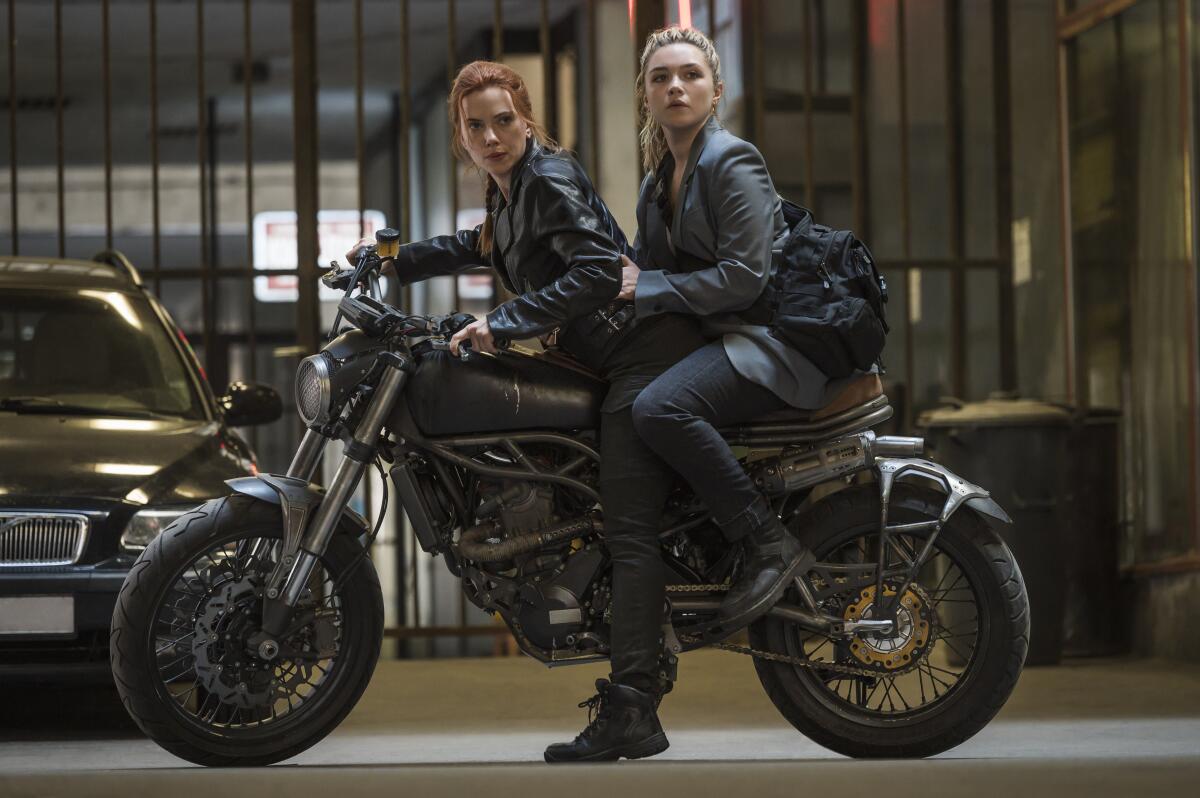
For her feature, which premiered earlier this summer, director Cate Shortland was interested in exploring the Avengers’ Natasha Romanoff (Scarlett Johansson) beyond the glimpses audiences have seen of her since her 2010 introduction in “Iron Man 2.”
“What I saw when I was watching the earlier films was this amazing character, but I saw a level of theater because she’s being observed,” said Shortland. “There’s this idea that the character is created to be looked at. What I wanted to do is say, ‘OK, what is she when she’s not being looked at? What is she when she’s alone in a trailer in the middle of [nowhere]?’”
Shortland’s goal was to uncover Natasha’s truth and tell a story that other women could see themselves in by dismantling all the labels that have been assigned to the character — like “femme fatale” and “superhero” — and showing the human underneath.
Not quite an origin story, Marvel’s ‘Black Widow’ is a solo venture for the character more than 10 years in the making. Director Cate Shortland and stars Scarlett Johansson and Florence Pugh on why this movie couldn’t exist earlier than now.
“Because she’s not [just] a superhero,” said Shortland. “She’s a sister, she’s a daughter, she is a woman. … I wanted her to have these moments that would allow the audience to understand her a bit in a more deep way.”
Although it took 10 years, Natasha’s evolution from a supporting character serving a purpose in another’s story to the star of her own feature signals that studios are coming to understand audiences’ investment in their characters. Especially in fictional universes with such rich lore as “Batwoman’s” or “Black Widow’s,” it’s no longer enough to adhere to convention: you must also rethink it.
And the recognition that viewer appetites are changing comes just as attitudes about what constitutes a “badass woman” are evolving once again.
These characters have grown beyond “just these women who have very little dialogue [and] are more like battle-hardened assassin types,” said Dries. “That’s what I used to think when I would think of a badass woman. … When I think of ‘badass’ I think less of somebody shooting two guns, one in each hand now — my new definition of ‘badass’ is like [Vice President] Kamala Harris or [Representative Alexandria Ocasio-Cortez].”
More to Read
The complete guide to home viewing
Get Screen Gab for everything about the TV shows and streaming movies everyone’s talking about.
You may occasionally receive promotional content from the Los Angeles Times.
